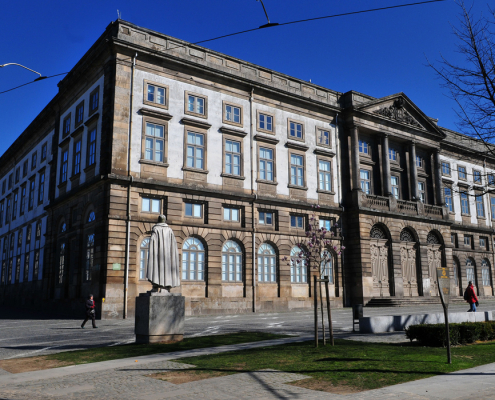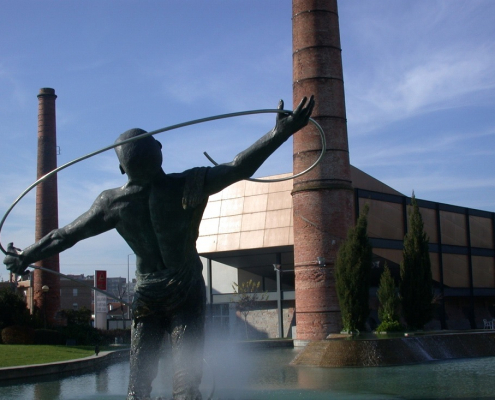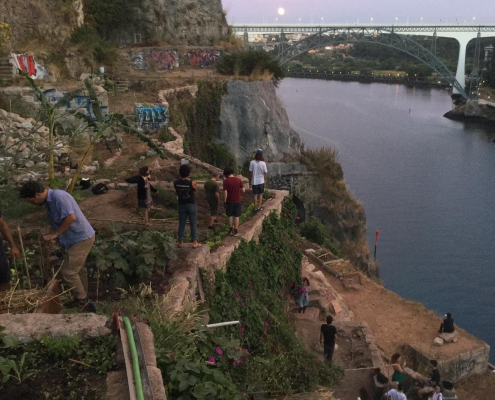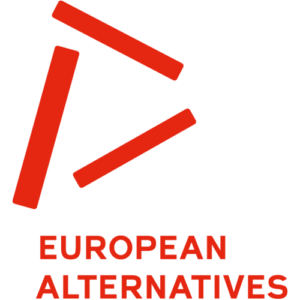COOPERATIVA ÁRVORE

Árvore – Cooperativa de Atividades Artísticas CRL, is a cultural cooperative recognized by the Portuguese State as a private organization of public utility. It was founded in 1963 by artists, writers, architects and intellectuals interested in creating new conditions for cultural production and dissemination, in a free and independent manner.
Árvore’s purpose is the production, dissemination and commercialization of artistic and editorial works and the training and information of members and the general public in the area of visual arts, art studies and other areas of creation and knowledge. In addition, Árvore also aims to enter into contact with other, national or foreign, organizations, with a view to artistic and cultural exchange; to create, organize and direct ateliers, classes, exhibitions or work teams within the artistic activity. In this sense, Árvore has grown with a plural and diverse cultural activity: conferences, lectures and conversations, exhibitions in Portugal and abroad, symposiums, workshops and free courses, competitions, awards, books, graphic work and multiple editions.
Headquartered since its creation in the historic area of Porto, the Passeio das Virtudes, in a building built by José Pinto de Meireles in 1763, enjoying a privileged view over the Douro river, the building was acquired by the Cooperative in 1989.
UNIVERSITY OF PORTO
 The University of Porto was created on 22 March 1911, as a result of the newly implanted republican system. However, it stems, since the 18th century, from many combined experiences of training in Science, Arts and Medicine, which would lead to the future University. Thus, when it opened its doors in 1911, the U.Porto was supported by the solid basis of an almost 150-year old process.
The University of Porto was created on 22 March 1911, as a result of the newly implanted republican system. However, it stems, since the 18th century, from many combined experiences of training in Science, Arts and Medicine, which would lead to the future University. Thus, when it opened its doors in 1911, the U.Porto was supported by the solid basis of an almost 150-year old process.
Today, the University of Porto (U.Porto) is a benchmark institution for Higher Education and Scientific Research in Portugal and one of the top 200 European Universities. The U.Porto combines high quality education focused on individual vocations and talents as well as market needs with the claim to being the greatest birthplace of science in Portugal. It is committed to converting into social assets the talent and innovation from its 14 faculties, one business school and over 50 research centers. The U.Porto has the richest academic community in Portugal and brings together the country’s highest ranked students, a highly qualified scientific and teaching staff and a growing number of international students, teachers and researchers. Its fully equipped campus embedded within the city guarantees an optimal academic, scientific, and also social and cultural experience.
VALONGO – FÓRUM CULTURAL DE ERMESINDE

The Ermesinde Cultural Forum occupies the building of an old factory, whose oven is preserved as a museum gallery. The adapted space also has an auditorium and galleries for temporary exhibitions. The old factory was founded in 1910 under the name Empresa Industrial de Ermesinde, dedicated to the manufacture of Marseille and brick type tile, among other ceramic products. In 1995, this decaying space was acquired by the Municipality of Valongo and, on May 18, 2001, the Ermesinde Cultural Forum was inaugurated. With the aim of decentralizing the cultural offer in its most varied aspects, the Forum is a multifunctional space for artistic production and dissemination, which is intended to be the core of the cultural life of the city.
The cultural project designed for this facility – where the new crosses the old – is based on the concept of contemporaneity. At the same time, the Ermesinde Cultural Forum preserves a testimony of the past that still remains in the memory of the inhabitants of the Municipality, contributing to the creation of a living history built by all. Conceived for a diversified use, the forum weekly hosts different events in the scope of the most diverse Performing Arts.
BOTANICAL GARDEN – HALL OF BIODIVERSITY
 Based at Casa Andresen, at Porto’s Botanical Garden, the Hall of Biodiversity is the outcome of the first phase of the ambitious rehabilitation project of the MHNC-UP, which is currently underway in close collaboration with Ciência Viva Agency.
Based at Casa Andresen, at Porto’s Botanical Garden, the Hall of Biodiversity is the outcome of the first phase of the ambitious rehabilitation project of the MHNC-UP, which is currently underway in close collaboration with Ciência Viva Agency.
Located in one of the most emblematic places in the city of Porto – the Botanical Garden, which together with it integrates the second pole of the Museum, the Hall of Biodiversity, officially opened to the public on June 30, 2017, is the first Ciência Viva Center specifically devoted to biodiversity. A space in which the arts connect with biology and natural history, fostering a wide range of sensorial experiences, carefully and intentionally crafted with the purpose of celebrating the diversity of life, the Hall of Biodiversity is the first museology platform in the world to be conceived from the start according to the total museology philosophy.
Herein, visitors will encounter an exemplary set of 49 exhibition modules and installations, many of which have been developed or adapted specifically for inclusion in its permanent exhibition covering all key aspects of the biological and cultural diversity we now know. With unparalleled features and functions and an amazingly rich set of museographic resources, ranging from mechanical models to the most sophisticated multimedia and audiovisual platforms, this unique exhibition invites visitors to take part in a journey through science, literature and the arts, along which the most beautiful tales about life will be told.
LIVRARIA ABERTA
 At Rua do Paraíso, since June 28th, 2021, Porto’s first queer bookshop, created by Paulo Brás and Ricardo Braun, has built a comprehensive catalogue that looks at the margins in an intersectional way: books by LGBT authors or characters cohabit with works featuring feminist, racial, and social exclusion themes.
At Rua do Paraíso, since June 28th, 2021, Porto’s first queer bookshop, created by Paulo Brás and Ricardo Braun, has built a comprehensive catalogue that looks at the margins in an intersectional way: books by LGBT authors or characters cohabit with works featuring feminist, racial, and social exclusion themes.
BANANEIRA COMMUNITY GARDEN
 Baneira Community Garden is a public urban community garden installed in the Fontaínhas district of Porto. The place, called after the banana tree that was first found in the area, started to develop during the quarantine in Portugal, between April and May 2019, by the idea of a few active citizens. After a few months the project counted more than 50 people already involving part of the surrounding community. It continues to rapidly expand inthe area, recuperating and regenerating the space previously occupied by illegal houses and illegal activities and waste spinning.
Baneira Community Garden is a public urban community garden installed in the Fontaínhas district of Porto. The place, called after the banana tree that was first found in the area, started to develop during the quarantine in Portugal, between April and May 2019, by the idea of a few active citizens. After a few months the project counted more than 50 people already involving part of the surrounding community. It continues to rapidly expand inthe area, recuperating and regenerating the space previously occupied by illegal houses and illegal activities and waste spinning.
LUSÒFONA UNIVERSITY OF PORTO
 The Lusófona University of Porto is a project of the largest private education group in Portugal, the Lusófona Group, and currently offersover 80 courses of various areas and cycles of education, particularly in the fields of Economics, Social and Business Sciences, Natural Sciences, Engineering and Technology, Communication, Architecture, Arts and Information Technology, Law and Political Science, Psychology, Education and Sport.
The Lusófona University of Porto is a project of the largest private education group in Portugal, the Lusófona Group, and currently offersover 80 courses of various areas and cycles of education, particularly in the fields of Economics, Social and Business Sciences, Natural Sciences, Engineering and Technology, Communication, Architecture, Arts and Information Technology, Law and Political Science, Psychology, Education and Sport.
The Lusófona University assumes as the primary purpose of its educational action the academic and professional qualification and promotion of its students, taking into account the requirements of quality, adequacy to the world of work and timeliness in the face of the constant advances provided by science and technology, with a view to building a more just, caring and equitable society. It is with this purpose that it seeks to build educational responses that integrate, on the one hand, the unity and diversity of the human being in a global world and, on the other, a new culture of learning and knowledge, based on freedom and personal responsibility, autonomy, cooperation and solidarity.
CAFÉ ESPIGA

A spike can be seen as a setback, a nuisance, they can symbolize entering adolescence, or it can be the result of the forking of several cobs, resulting in countless other cobs. But for us, “Espiga” (pt-word for spike) was the result of a maturation of ideas marinated in a drawer, which marched off to be put into practice. We took our various diramations and decided to concentrate on a common point. For us, Espiga is Space of Imagination, Taste and Arts – a dynamic space, in constant change, serving good food. Like any spike, we want it to grow, mature and bear fruit – fruit of our and your inspiration – we don’t want to reduce ourselves to one spike, we want to be several and form a crop.
(Team Espiga)

